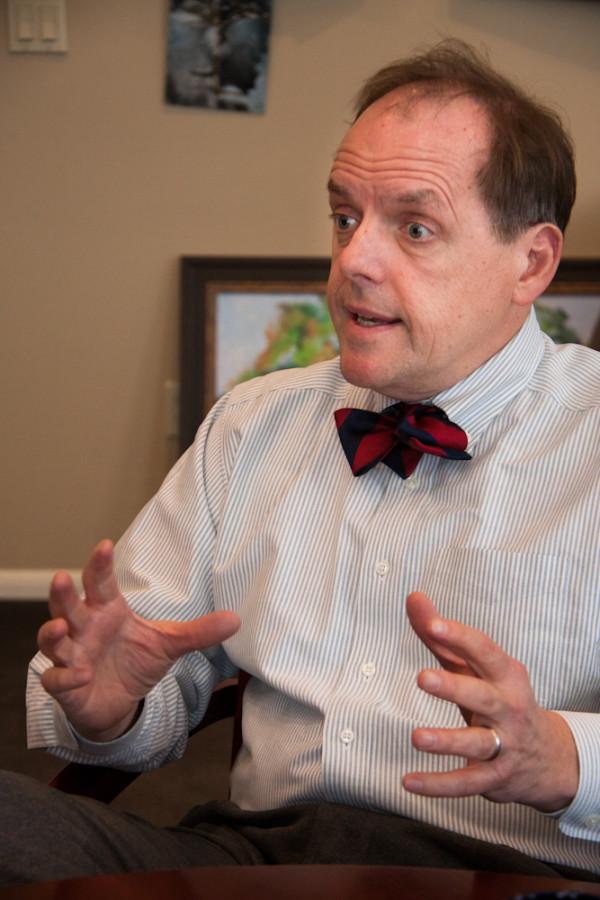On Friday, Nov. 18, Whitman announced the start of its “Now is the Time” campaign at a dinner for Trustees, alumni and friends of the college in Seattle, WA, kicking off the public phase of a new fundraising endeavor for the college.
“It is unusual for a college to go as long as Whitman has gone without holding a comprehensive campaign,” said John Bogley, vice president for development and college relations. “This is Whitman College’s first comprehensive campaign since the $50 million Campaign for Whitman from the 1980s.”
The “quiet phase” of the campaign, which started July 1, 2007, ended Nov. 18 with the approval by the Board of Trustees to bring the fundraising public. The goal is to raise $150 million for the college by June 30, 2015. The college already has about $97 million in funds committed before the public phase of the campaign.
“The world is changing very rapidly,” said President George Bridges. “We must provide different types of experiences to students to prepare them adequately for the world they will inherit.”
“Now is the Time” aims to provide financial support for three distinct areas of the Whitman education. It looks to bolster the academic program, adding 12 endowed professorships as well as providing students more opportunities for research and internships. $75 million are allocated for this purpose, while $50 million are designated for additional financial aid. The remaining $25 million will go to the general Whitman endowment, funds that allow the college flexibility to “respond immediately and aggressively to new challenges and provide extraordinary opportunities for students each year,” according to a campaign pamphlet.
According to Bogley, the selection committee who hired Bridges looked for a new president to lead a new fundraising campaign. Bridges began his tenure in 2005.
“The selection of George Bridges really put into fast-forward the idea of pursuing this campaign,” said Bogley. “We began planning for this campaign the minute George arrived.”
While the campaign aims to improve many areas of the Whitman education, it also is focused on sustaining the quality of education already present.
“We want to preserve those parts of what has always proven integral to a Whitman education and yet enrich them,” said Bridges. “Small classes, close relationships between professors and students, rigorous academic work: it’s always been a part of the college. We will retain those. but what we want to do is enrich the classroom experiences with new approaches to material and new kinds of experiences outside the classroom.”
Funds from the campaign will go toward advancing off-campus studies, increasing opportunities for student-faculty research and providing more internships for students. But the benefit to the college is not only in the future. The funds already raised during the quiet phase of the campaign have gone to significant projects around campus.
According to Bogley, projects like the renovation of Harper Joy Theatre and Sherwood Athletic Center were funded at least in part by some of the $97 million already raised for the campaign. Additionally, two faculty chairs were created from donated funds to support current professors. Specific departments like biology and chemistry have already seen an impact.
“[Students] are already directly benefiting from [the campaign],” said Bridges. “It’s not something that’s ten years down the road. The effects are being felt right now.”
The public section of the campaign is the result of a carefully planned private phase of donations. The fundraising managers begin with a vision, and reach out to longtime donors and close friends of the college to see if people are willing to donate to that vision. According to Bogley, if there is success in the initial phase, a discussion of opening it to become a public campaign begins.
“The overarching reason for the campaign is to generate enthusiasm, a call to action,” said Ruth Wardwell, assistant vice president of Communications. “It draws attention and focus on the college. It draws together common interests in the success of the college now and in the future.”
The difference in the campaign in the public phase is that the college reaches out to more than individuals who have a history of donating to the college.
“We are expanding the circle of people who we hope will contribute significantly to the future of Whitman,” said Bogley.
This includes asking alumni and friends who have made small contributions in the past to gift more significant amounts, and it includes encouraging first-time donors to contribute.
“We’ve been remarkably successful [in the quiet phase of the campaign], especially given the economic headwinds that have faced our country for the last two and a half years,” said Bogley.
According to Bogley, people donate to the college when they are confident in the education it provides. Bogley said that no matter what profession alumni end up in: business, law, medicine, teaching, the ministry, social services, non-governmental organizations, governmental organizations: they are well prepared by their time at Whitman.
“Whitman people go out and do all those things, and they do them better, we believe, and donors believe, because of the quality of the liberal arts education,” said Bogley. “People give to Whitman because they believe it’s a change agent for bettering the world in all sorts of ways.”
“It gives me enormous pleasure to ask alumni and friends of the college to invest in an institution that’s moving ahead,” said Bridges. “So many institutions, particularly public institutions, are just struggling immensely to keep what they have.”
Both Bogley and Bridges expressed their confidence for the success of the campaign over the next four years.
“Whitman has a very bright future, and this campaign will continue to move us in a direction that will have profound benefits for our students, faculty and staff,” said Bridges. “It’s all about the people.”
The campaign leaders are holding an official kick-off Friday, Dec. 2 in Cordiner Hall at 4 pm. Students, staff and faculty are all encouraged to come and learn more about the campaign, and what it means for the future of Whitman.





